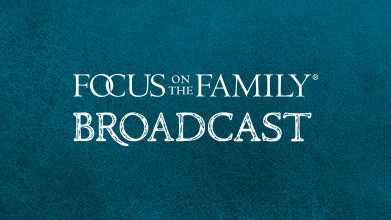Opening:
Excerpt:
Terry Looper: The problem was, I was unwilling to sacrifice my new relationship with my wife and my daughters and my new relationship with the Lord to make money. I no longer was willing to do that. That pain of burnout was deep enough and bad enough, I said, “I’m not doing that.” So it was very perplexing, uh, how you start a company with your own money and – totally committed to – to not sacrifice relationships?
End of Excerpt
John Fuller: That’s Terry Looper explaining why you need to slow down and trust the Lord rather than try to run your own life. And, we’re gonna cover that topic today on Focus on the Family. Your host is Focus president and author Jim Daly. And I’m John Fuller.
Jim Daly: John, this is one of those broadcasts where you say, “Warning alert.” This is gonna cut really close to home!
John: Yeah (laughter).
Jim: So run. Run now. But, uh, this is the kind of content we need to cover. Um, so many of us are running so fast. And we live in a busy, driven culture, and we need to be reminded about what God’s pace is for our lives. And it’s probably gonna be uncomfortable when someone’s saying, “Hey, I used to do it this way, which is the way most of us are still doing it. And I found a better way.” Uh, but you’re gonna be blessed. Uh… Even Christians, we can get caught up in that relentless pace. We should know better, but we fall prey to it ’cause we’re tryin’ to provide for the family, do all the things we need to do, volunteer at church. And – and, you know, it just starts rollin’ like a snowball downhill. And before long, your marriage isn’t doin’ that well. Maybe your parenting is not what it should be. And you wake up, and you say, “Man, something has to change.” This could be that moment for you.
Um, I think it’s in the Old Testament verse where it says, “Be still and know that I am God.” I think it’s Psalm 46:10. That can be challenging to live out. Uh, but we’re gonna encourage you today, through Terry Looper’s story, to consider living it that way.
John: Yeah. There really is a benefit to being still and to looking to God, not our own ability to – to make life happen. And so I think this is going to apply to all of us, as you said, Jim. I’m particularly wishing I had heard this message back when I was about 30, 35. We had young kids…
Terry: Wish I could have – I wish I coulda written it back when (LAUGHTER) …I was 35.
John: You know, young kids and just – just doing what you said, so fast, so full and not takin’ time to listen.
Jim: Yeah. Well, it’s never too late. Uh, Terry Looper is a businessman. He’s an entrepreneur. Uh, he’s experienced great success and also some, uh, valleys. Uh, Terry is the president and CEO of Texon,LP, a Houston-based energy company that he founded 30 years ago, 1989, the very year I started here at Focus on the Family. Terry’s been married to his high school sweetheart – I always love that – Doris for 50 years. And they have two grown daughters and five grandchildren.
Body:
Jim: Terry, welcome to Focus.
Terry: Thank you. Thank you.
Jim: That’s exciting, yeah. Five grandchildren.
Terry: Yeah.
Jim: That’s the best part, right?
Terry: Absolutely. Absolutely.
Jim: (Laughter) Boys and girls, or…?
Terry: Yes, boys and girls.
Jim: Yeah. So they totally spoiled?
Terry: We try to. (Laughter) We try to.
Jim: That’s good. That’s the way it should be with grandparenting, right?
Terry: Absolutely.
Jim: Well, let’s – let’s get into it, uh, Terry because, uh, so much of your story I know is gonna help people. I – I mentioned off-mic we – I was on the phone early this morning with a businessman that’s, uh – happened to be in China working, uh, with a board of an American company that had their board meeting there. And he sounded stressed. I said, “Well, you need a book that I’m gonna (LAUGHTER) do an interview on this very day.” And, uh, Sacred Pace is the title of it.
And let’s get there. Uh, where were you at when you were this driven person? What kind of personality did you possess? And why was it so important for you to be successful?
Terry: Well, you know, I didn’t really know until later, um, after my crash. But, uh, I found out that I was tryin’ to get the attention of my parents.
Jim: Really?
Terry: Is really what was driving me. And I didn’t know it at the time, but I just knew if I’d become wealthy that that would maybe satisfy what I wanted in life.
Jim: It would define who you are…
Terry: Yeah…
Jim: …In a positive way.
Terry: In a positive way.
Jim: And that’s not – that’s not necessarily negative.
Jim: So – OK. Pull it forward. You – you get married. You’re still driven. You’re doing sales. You’re doin’ well.
Terry: Right.
Jim: What’s happening in your life that’s positive, and what’s not so positive?
Terry: Well, I had worked for 10 years for Monsanto, and they probably transferred me six, seven times in different roles. And so they were – seemed to be pleased with my performance and all that. But I – I got to where I didn’t want to be at the big company any longer, not knowing I was really an entrepreneur – still didn’t really know that.
Jim: Yeah.
Terry: And then I went to – helped start an energy company. And that’s where the pay started increasin’ around, um, it was the first time I’d ever had a chance to really have unlimited income…
Jim: Yeah.
Terry: …And – and eventually earned, um, some ownership
So that’s, uh, – I thought that…that’s what speeded me up. And then what compounded is I was a huge people pleaser. I don’t know how to express the level of people pleasing. I mean, in – in high school, again, I was overachiever, so I wanted to be officer in a lot of different things. But I wasn’t willing to be an officer in anything where there was any conflict.
Jim: OK.
Terry: So I could be a vice president in most organizations ’cause you didn’t do anything…
Jim: Right.
Terry: …And I could be president of the – of the class ’cause they didn’t do anything.
Jim: Right.
Terry: But don’t be president of the student body ’cause they had to do things. And…
Jim: There were problems.
Terry: Yeah, they could have problems.
Jim: (Laughter) You had to solve the problems.
Terry: So, I mean, it was – it was deep-rooted. And so need to say, to run an organization, I was No. 2 at that company and had a lot of people under me and a very driven boss. The stress of being a people pleaser and tryin’ to catch my false God, as I learned later…
Jim: Yeah.
Terry: …Though I thought I was a Christian was, uh, you know, waitin’ for a – a crisis.
Jim: Let me, uh, move the story along. I know Doris began – your wife began to see some things that were different when you begin to burn out. And – and the description was so good as I was reading it this morning, where literally messages were falling out of your pocket and fallin’ to the floor, which wasn’t your style.
Terry: Right.
Jim: Um, describe what was going on because there are people listening that may be in that very spot that you were at where they’re beginning to lose control. And I – I’ve never had that experience, but I have had friends that have had that experience. And I think it’d be really helpful to just give the adjectives of what was happening and what was Doris observing.
Terry: Wow, she – she observed a lot. I was just obsessed with growing this company, uh, whatever that took. And back in those days, they had pink slips when you get a message from a phone call or…
Jim: Right, right. I remember those.
Terry: And so she would see my pockets full of ’em and fall out of my pockets when I was home that I hadn’t returned yet. And` my brain started getting fuzzy.
Jim: Huh.
Terry: And I started getting dizzy. And I went to the doctor, and he said it was due to stress. And I’m goin’, “Well, I ain’t ever heard that before.” He said, “Well, that’s your case.” And I said, “Well, can you give me some medicine for it?” And he said, “No, I’m not doin’ that.” And I thought, wow, golly, I thought all doctors would, you know, give you some stress medicine.
Jim: (Laughter) Right.
Terry: Anyway, fortunately, I think the Lord was in my camp there, not lettin’ me mask my pain and – and continue to let my brain get fuzzy and keep gettin’, uh, dizzier and dizzier and it was just a zoo. It was just…
Jim: Yeah.
Terry: …A complete zoo.
Jim: So you were kind of losing your grip, but you weren’t quite sure, right?
Terry: Right.
Jim: Is that a fair way?
Terry: Right, right.
Jim: Now, in your relationship with Doris – again, this is so critical, Terry, because people live in this place where the cracks of stress show up so abundantly in your marriage.
Terry: Right.
Jim: (Laughter) Right? That’s…
Terry: Amen. No…
Jim: …The person who knows you best.
Terry: …When you’re terribly stressed, one of two things – it’s either health or relationships.
Jim: Right.
Terry: Right?
Jim: It’s usually true.
Terry: Usually, relationship first, then health. Yeah – so yeah, my relationship with Doris was strained. I was a poor dad. Uh, you know, I’d – I’d say, “I’ll – I’ll take you to the movie on Saturday.” And then by Saturday, I was so exhausted, I wouldn’t keep my promises.
Jim: Or you had other commitments that…
Terry: Yeah.
Jim: …Work brought on…
Terry: Yeah, yeah.
Jim: …Right? And that always took first place.
Terry: Right.
Jim: You got to the point where you actually said to Doris, “I don’t know if I love you anymore.”
Terry: Right.
Jim: I mean, because so much of your attention and your – I guess your care in your life was aimed at your business…
Terry: Right, right.
Jim: …And not your wife and not your family.
Terry: Right.
Jim: How did she react, and what – what were you tryin’ to – what point were you trying to make?
Terry: Oh, I don’t even know if I had a point. You know, I was so lost and confused. Uh, she was an amazing, uh, wife and – and parent and very, very committed to the family. So her response was to me – and – and, actually, it was truthful – she said, “No, you’re just confused. You just don’t realize you do love me.”
John: Hm.
Jim: That’s a great answer!
Terry: Right.
Jim: Yeah.
Terry: And I’m goin’, (laughter) “Well, maybe so, you know?” And, uh, I told her that over lunch as I was goin’ on a business trip. And – and then I left her hangin’. And that was her comment back to me.
Jim: Yeah. That’s gracious.
Terry: Right.
Jim: I mean, a lot…
Terry: Amen.
Jim: …Of people would say, “Hey, you know what? I don’t love you either.”
Terry: Right.
Jim: “So what are we gonna do about it?”
Terry: Well, I’ve had friends, uh, write us notes at this book that, really, she’s the earthly hero of this book. And I – I completely agree.
Jim: Yeah. OK, let’s move into the day your world kinda caved in. What was happening? What were the business pressures? And what took place that – that very day that you realized, I’m in trouble?
Terry: Well, the dizziness kept on coming. And I could still function, but the fuzziness got to where I couldn’t make even little decisions. And I started hidin’ the fact I couldn’t even make little decisions.
Jim: Was it fear? What was happening?
Terry: Well, I – I found out later it was, um, just burnout from overtaxing the brain. You know, like a marathon runner hittin’ his wall, your brain is like a muscle. It can only withstand so much thinkin’. It needs downtime too…
Jim: Interesting.
Terry: …And – like legs. And, uh, evidently, um, you know, I wasn’t allowin’ it to do ’cause my brain – I never turned it off…
Jim: Yeah.
Terry: …Because I was either thinkin’ about how to get what I wanted or make money, whatever. So on a Saturday morning, I was at home with my family, and my brain quit. I don’t know how to…
Jim: What – what did that look like? I mean, what does that mean?
Terry: I tell you; I don’t know. The only way I can describe it is like when a marathoner hits his wall. It just would not think. I couldn’t think. I mean, I was present, and I wasn’t, uh, illucid (ph). I mean, I – I could – I realized my presence. But I told my wife, “My brain is – shut down on me. Take me to the bedroom.” And so I was coherent enough to know what was happenin’, so to speak. And she put me in bed and shut the door at my, uh, request. And really, all I know to do is cry. I – I thought I’d either had a nervous breakdown. I thought I maybe lost my brain for life. I didn’t know what was goin’ on.
Jim: That’s something – not everybody will experience that…
Terry: No, no.
Jim: …Obviously. But you just – were you fearful? What was going on?
Terry: Yeah, yeah. I was very fearful.
Jim: What’d you do next? Who’d you call?
Terry: Well, I finally, um, didn’t know anything else to do. But thinking I was a Christian, I got on my knees and prayed to the Lord, “Please take control of my life.” Because out of desperation and total fear, I realized I had done a terrible job. I thought I’d lost my brain. And so I just asked him to take control. And, um, I found out later on that I had been born again that mornin’ on – on my knees there. I didn’t – I thought I was a Christian because I was tithin’, had been tithin’ less than a year, but 10%. I had been a deacon. And the next Saturday, I was getting ordained as an elder.
And so I prayed. Um, but I realized later on I prayed like a 6-year-old believes in Santa Claus. I mean, he really does believe in Santa Claus, and I really did believe in the Lord. But I didn’t want him to be my Lord. I kinda wanted him to be – I kinda wanted to be the Lord and say, “I need this present for Christmas. And I need that present for Christmas. And fix Doris, and fix my employees and…”
Jim: Kinda the control thing.
Terry: Yeah, yeah.
Jim: (Laughter) Let me be in control.
Terry: I kinda wanted to be boss.
Jim: OK, so here’s the question. This is exciting. I can’t wait to ask it. In – in Sacred Pace, your book, you mention how Mark 10 now really became a life to you. That’s the question of the rich, young ruler. And so many of us, as we read scripture, we struggle applying it to our lives. These are ancient discussions, ancient people, ancient ways.
Terry: Right, right.
Jim: You know, they didn’t live in modernity with cellphones and…
Terry: Right, right.
Jim: …But the irony of ironies is…
Terry: Right.
Jim: …The human heart is exactly the same.
Terry: Right, right.
Jim: So how did Mark 10 and the rich, young ruler begin to become real to you?
Terry: Well, a little bit like the rich, young ruler, he – he was blind. When he went to saw – see Jesus, he thought he was doin’ everything right. I was…
Jim: Right. And he gave him the list, didn’t he? (Laughter).
Terry: Yeah. And I was blind – I mean, I wasn’t – I wasn’t blind to think I was that good. But I was blind to thinking I was a good, normal, Christian man being a nice father and husband. And so I was, uh, as blind as he was.
Jim: Hm.
Terry: And then through me being born again, the Lord started showing me I was – I had been a pitiful follower. I hadn’t really been a follower and, really, my values were pretty pitiful.
Jim: Wow. What – again, for the person struggling, what were the one, two, three things that made you feel like, “Oh, now – now I get it”? Family did become important to you. Your spouse was No. 1, uh, after the Lord. What were those things that can – you know, can – it made it more concrete that you are in God’s family now?
Terry: I would say I learned that, unfortunately, I believed love was words rather than action.
Jim: Uh-huh.
Terry: And I found that action was really love. And I found my yearning for action to love my family, to hang out with my daughters, to hang out with my wife with no agenda, to want to take ’em on trips, to just go up to my daughter’s bedroom. I ate breakfast with my youngest daughter every school day for about six years.
Jim: After that day.
Terry: …After that. And she’d walk downstairs. I’d be in my quiet room. She’d walk by it. I’d go in the kitchen, sit up on the counter. And she’d be an expert, and I’d just listen.
Jim: And that was 180 degrees different from what you did before.
Terry: Oh, my gosh.
Jim: What was it like before?
Terry: I was already gone.
Jim: Yeah, gone out the door.
Terry: Yeah. I was already gone.
Jim: Early bird gets the worm.
Terry: Oh, yeah. (Laughter) And so my other daughter was gymnastics six days a week. So I started taking her, picking her up, taking her to get donuts, sitting up in her room listening.
Terry: You know, just – it – you know, the proof was in the pudding…
Jim: Right.
Terry: …I guess is what I’m saying. It was drastic.
Um, my youngest daughter had, in the second grade, said she wanted me to help her with the math because that was my giftedness. But she didn’t want help in her math in second grade. She just wanted me. So I told her, “I’ll get you a tutor.” And then – you know, but you know she didn’t want a tutor.
Jim: Yeah, but…
Terry: And anyway, so once I hit – once I started, I said, “OK. I’m ready to tutor you in math,” and it took me three years before she’d let me tutor her.
John: Hm.
Jim: Wow.
Terry: …After I was changed.
Jim: So her heart was closed.
Terry: Yeah!
Jim: Huh.
John: We’re talking today on Focus on the Family with Terry Looper. And, uh, I hope this is really resonating with you. Um, I’m feeling a little bit of (Laughter) the pain here in a good way.
Jim: Aren’t we all?
John: Uh, Terry has a great book. It’s called Sacred Pace: Four Steps To Hearing God And Aligning Yourself With His Will.
We’ve got that and, uh, copies of this broadcast at our website or you can call. Our number is 800, the letter A and the word family. Online, we’re at focusonthefamily.com/broadcast.
Jim: Let’s get to the four steps that you’ve outlined in the book which are based off of Proverbs 3:5 and 6, “Trust in the Lord with all your heart and do not lean on your own understanding. In all your ways acknowledge him, and He will make straight your paths.”
Terry, I love that verse because imagaine me the orphan kid, and then when I was in college, God’s word really began to take root in my heart. Explain how that verse impacted your life.
Terry: Well, following my burnout and following us selling our company and me obtaining more money than I ever expected as, uh, a kid from a small town, I started, uh, journeying about what I’d do next and, uh, finally realized that I just loved business deals.
Terry: And so that brought me alive. So …
the problem was, I was unwilling to sacrifice my new relationship with my wife and my daughters and my new relationship with the Lord to make money. I no longer was willing to do that. That pain of burnout was deep enough and bad enough, I said, “I’m not doing that.” So it was very perplexing, uh, how you start a company with your own money and – totally committed to – to not, um, sacrifice relationships?
So he convicted me after – it was a long period of time. He convicted me to start Texon with these four steps that I really couldn’t articulate for many years later. And I’d been practicing them for 30 years, practicing for 20-something before I really talked about them…
Jim: Uh-huh.
Terry: …To anybody.
But he convicted me in this process to start Texon at 40 hours a week max and have no sales goals so they wouldn’t be false idols.
Jim: (Laughter) OK. I’m laughing because…
John: And you come from a sales background.
Jim: …It just flies in the face of every business book…
Terry: Every …
Jim: …You ever read. So don’t spend more than 40 hours a week at the vocation…
Terry: Right.
Jim: …So you have margin for family and other things. OK. A lot of men hearing this right now are balking.
Terry: Right. Right. Right. I know.
Jim: “OK. That’s ridiculous.”
John: Yeah, sure.
Jim: “That’s Terry Looper.”
Terry: That’s right.
Jim: “He could do it maybe…”
Terry: Yeah, really. I know.
Jim: “…But not me. He doesn’t know my boss” – whatever.
Terry: Exactly.
Jim: And then the second component of that – just throw off the sales goals.
Terry: Yeah.
Jim: …And let the Lord guide you. OK. You’re in it again! (Laughter).
Jim: “That’s a lot of hooey. Who can do that?”
Terry: Very few.
Jim: I’m a goal-oriented person.
Terry: Yeah, very few.
Jim: So let’s do some counseling right now. Tell me why that’s wrong.
Terry: Well, I – we have goals, but they’re – they’re – they’re not metric goals. And what I’ve learned is, over the years – I didn’t know why I wasn’t supposed to do it at the time, other than he convicted me of it, but if you go into the fourth quarter and you need a certain amount more sales, you start sacrificing things, either with your family to meet those goals or with your customer or your margin or your sales volume.
Jim: Right.
Terry: You – something goes wrong when you’re forcing a deal before it was a natural evolution of occurrence. And, uh, so he’s blessed me with the benefit of that to where you can – I can stay in my relationship with customers until the end. And, uh – but it is radical. And I don’t recommend that for anybody or even 40 hours a week other than – if that’s what he convicts you of, that’s what you’re supposed to do. So…
Jim: No. It’s so good. And I want to hit these four.
Terry: Sure.
Jim: And then you can comment on them.
Terry: Sure.
Jim: …Because we’re right at the end. And listen. This is a great book to order your life in such a way that God will be honored.
Terry: Yeah.
Jim: That’s the testimony Terry’s giving you. He had it out of whack, and the Lord…
Terry: Right.
Jim: …Through, you know, a valley…
Terry: Right.
Jim: …And having an emotional, nervous…
Terry: Yeah. Yeah.
Jim: …Kind of breakdown, right?
Terry: Yeah. No.
Jim: So you listen to someone who’s gone through that. But you say, consult your friend, Jesus.
Terry: Right.
Jim: I love that. I love the wording.
Terry: Right.
Jim: Uh…
Terry: Which is prayer.
Jim: Prayer – gather the facts.
Terry: Right, critical.
Jim: Um, so you need to know what’s true.
Terry: Right.
Jim: Boy, that’s true in your spiritual life as well.
Terry: Right.
Jim: Isn’t it?
Terry: Right.
Jim: It starts there – and then what’s true of your physical surrounding as well.
Terry: Amen.
Jim: Uh, that’s a – that’s a great one. Watch for circumstances. What do you mean by that?
Terry: Well, I think – I think all circumstances are of the Lord. And I think he – if you’re really praying to do his will, I think he will reveal which ones really are relevant in your process of trying to discern his will…
Jim: Yeah.
Terry: …These four steps of trying to discern his will.
Jim: So Romans 8:28 really applies in this – in this life. All things work for good to those who love…
Terry: Yeah. I really believe that. And so it relaxes me of not trying to overly try too hard on which circumstance.
Jim: Yeah.
Terry: ‘Cause, I mean, if you…
Jim: I like that.
Terry: You know, Psalm 37:4 says, “Delight in the Lord, and he’ll give you the desires of your heart.” So I think seeking his will means you’re delighting in him. So I think he’s gonna give you the desires of your heart, which – one little, minor thing – is which circumstances matter in this process.
Jim: Terry, so often, you know, young and old doesn’t – I don’t think age is the issue – but we stress about being in his perfect will. I think often, especially somebody in their 20s and 30s, vocationally, they’re looking for that perfect spot. They wanna be committed to the Lord. They wanna do exactly what he wants them to do. But I don’t know if that’s an engineer, a doctor, you know, somebody working a blue-collar situation.
Terry: Right, right.
Jim: What advice do you have for that – that person who’s always in turmoil ’cause they’re never satisfied with what’s right in front of them, what they’re doing?
Terry: Well, I – I’ll go on to say that the fourth part – fourth step is – is the reason I wrote the book. And that’s called getting neutral or – or basically dyin’ to self.
And I think you have – well, I’ll say it this way. George Muller in the 1800s, who was a great missionary…
Jim: Yes.
Terry: …Said – he’s got a great discernment process for the Lord – and he – he says that, um, 90% of the solution of really understandin’ the Lord’s will is, uh, dyin’ to self, wantin’ his will more than your own and gettin’ that from your head to your heart. It’s got to be in your heart, not your head.
And so my answer is you – you’ve got to get to where you finally, finally, finally want his will so much that you’re willin’ to jump off the cliff. You’re willin’ to, quote, “Start 40 hours a week, no sales goals” if that’s the crazy thing he gives you, um, that he will bless you and – and give you peace around an answer if you finally die to self.
Jim: So, Terry, if we were to have your daughters here and to ask them point-blank…
Terry: Oh, goodness.
Jim: “…How has your daddy changed?,” what would they tell us?
Terry: You know, six months into Texon, when we weren’t makin’ money, and I wasn’t drawin’ a salary, they sat at the dinner table as young ladies, uh, teenagers, and said, “Dad, we don’t know why you put off startin’ Texon so long. We hadn’t seen any change in the new dad since you started this company.” And I cried and cry now because I am not that much of a Christian. I’m not that great of a Christian. It was through, um, the trust in the Lord and the fact that what the Lord could do to my heart that I could go home every day and not – and they didn’t pick up on that I’d started that company. That just blows my mind. And that is the Lord. That is not me, honest.
Uh, I – my daughters would also agree with that. (LAUGHTER)
Jim: Well, and I love the fact – it seems like they would say, “We have our daddy.”
Terry: Yeah.
Jim: And…
Terry: The daddy we didn’t know.
Jim: The daddy we didn’t know.
Terry: Yeah.
Jim: Man, that – that cuts right through the heart of every father…
Terry: Yeah, and pride of many…
Jim: …And probably through many mothers who are in the same kind of position where they’re torn. /
Terry: I encourage couples to go away that have kids. I – I say, “Y’all forgot why you married each other.” And they’ll look at me, say, “Yeah, kinda.” I mean, they’re on such a pace of workin’ with their kids…
Jim: Just doin’ life.
Terry: …Doin’ life!
Jim: Yeah. Boy, that’s so true. And it’s – it’s what – um, you know, it is what it is. Uh, what about Doris? What would Doris say today? Does she know that you love her?
Terry: I, you know (Laughter) …um, our marriage is – you know, being 19, and we came from very dysfunctional families. We got married at 19, started our family at 24. But we’re in awe of where our marriage is now. I mean, it’s an absolute miracle.
Jim: Yeah, 50 years.
Terry: Fifty years.
Jim: Congratulations.
Terry: Yeah, and it’s gotten a lot better even in the last two or three.
Jim: Yeah.
Terry: And, you know, it embarrasses me when the Lord reveals something to me in my late 60s and that I change and get a little better. It embarrasses me. But it’s better in the late 60s than never at all.
Jim: Absolutely!
Terry: So it’s – so the marriage journey continues.
Jim: And, you know, no matter where you’re at in your journey, I think Terry’s book, Sacred Pace, is a resource that you need because this is evidence of a man who was broken, was doing it incoherently and not the way that the Lord wanted to.
Terry: Right.
Jim: And it represented itself in his physical body.
And I want to listen to people like that because you’ve lived it, Terry. You have seen the transition. Your children testify to the change. Your wife testifies to the change. That’s the power of God working in you and through you. And…
Terry: I’m telling you, it is clearly His.
Closing:
Jim: It’s it. And I don’t know why a person wouldn’t want to read the story, frankly. So get a copy of Sacred Pace right here from Focus on the Family. Remember; when you get the resource from Focus, those proceeds go back to saving marriages and helping parents do a better job and saving a preborn baby from death. I mean, you can certainly buy it from that big online retailer. But let me tell you what, I don’t know that they’re using the proceeds in that way.
So help us. And if you can give a gift of any amount, we’ll say thank you by sending a copy of Terry’s book Sacred Pace to you as our way of saying thank you.
John: Hm.
Jim: And if you can do it monthly, that’s great. Let’s do ministry together. And I think Terry is on it. His book will show you what it means to walk with Christ. Terry, thanks for being with us.
Terry: Thank you. It was my joy, my pleasure.
John: Well, get in touch with us, and make a donation if you can. Get a copy of Terry’s book. And I’d also suggest the booklet Coming Home. If what we talked about earlier in the program about the spiritual life made a real impact on you, we have this resource, Coming Home, which describes some next steps as a new believer in Christ.
Our phone number is 800, the letter A and the word family. 800-232-6459, and online we’re at focusonthefamily.com/broadcast. We’d also love for your feedback about these broadcasts. Please take just a few minutes and answer some questions and tell us what you think, what you like about our programming and ways we can improve as well. We wanna serve you the best we can, and the survey will really help. Well, I hope you have a great weekend with your family and uh, your church family as well. And, join us on Monday as we examine how God views our sexuality so much differently than the world around us.
Teaser:
Dr. Juli Slattery: Well first of all, it says that the average Christian has a very limited understanding of God’s design for sexuality. They’ve memorized a list of rules maybe, but those rules no longer make sense to them.
End of Teaser





















